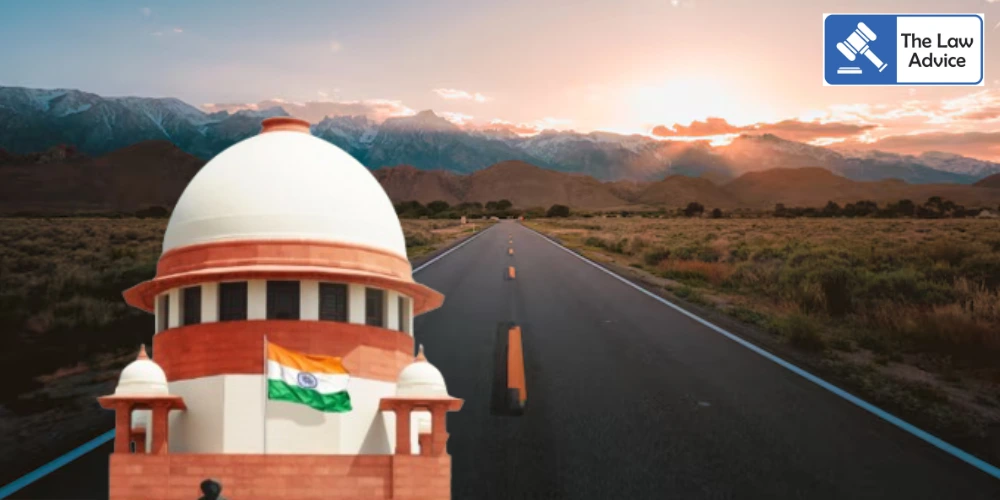The Supreme Court of India has delivered a significant judgment affirming the Kerala High Court’s decision that the National Highways Authority of India (NHAI) cannot compel commuters to pay tolls if the condition of the highway is abysmal and unfit for smooth travel.
A bench comprising Chief Justice of India BR Gavai and Justice K. Vinod Chandran dismissed the appeal filed by the NHAI against the Kerala High Court’s order which had suspended toll collection at the Paliyekkara Toll Plaza on the Edapally–Mannuthy stretch of National Highway 544 in Thrissur district.
The Court recorded its agreement with the Kerala High Court’s reasoning that a toll-paying citizen acquires a corresponding right to demand well-maintained, safe, and motorable roads. The bench stated that when commuters are made to pay user fees under law, the NHAI and its concessionaires are legally bound to ensure free and unhindered access.
The bench observed:
“The obligation of the public to pay a user fee under statutory provisions is premised on the assurance that their use of the road will be free from hindrances. When the public is legally bound to pay a user fee, they simultaneously acquire a corresponding right to demand unhindered, safe, and regulated access to the road. Any failure on the part of the National Highways Authority or its agents to ensure such access constitutes a breach of the public’s legitimate expectations and undermines the very basis of the toll regime.”
In unusually candid remarks, the Court expressed concern that citizens are being burdened twice: first through motor vehicle tax and again through toll fees. The order highlighted several systemic flaws:
• Roads under Build-Operate-Transfer (BOT) contracts often lead to contractors recovering far more than they spend on construction and maintenance.
• Highways frequently deteriorate due to neglect and natural wear, with authorities failing to maintain them.
• Toll booths themselves become sites of harassment and inconvenience, with long queues, overworked staff, and delays causing both financial and environmental costs.
The bench lamented:
“That the poor citizen is bound to wait for hours, in queue and in a cramped space, with the engine running but hardly moving, is a tragedy. That the toll is really on the purse and the patience of the citizen, as also the environment, is the downside.”
The Supreme Court made it clear that the suspension of toll collection would not be indefinite. The NHAI or the concessionaire may seek lifting of the suspension once the road is restored to smooth and safe condition. Regarding revenue loss, the Court suggested that concessionaires could approach the NHAI for relief or seek an extension of their operational period.
Meanwhile, the bench firmly stated that citizens should not be forced to pay tolls for “navigating gutters and potholes, symbols of inefficiency.”
During the hearing, the bench questioned how commuters could be asked to pay when a journey meant to take one hour on the Edapally–Mannuthy stretch was taking over 12 hours.
CJI Gavai remarked:
“Why should a person pay ₹150 if it takes 12 hours for him to get from one end of the road to the other end?”
Justice Vinod Chandran added that the court was aware of the ground reality, as both he and the Chief Justice had personally experienced the traffic snarls on the route.
The controversy arose after commuters filed petitions before the Kerala High Court complaining of severe traffic congestion and dangerous conditions on the Edapally–Mannuthy stretch of NH-544. On August 6, 2025, the High Court suspended toll collection for four weeks at Paliyekkara, noting that the NHAI had failed to maintain the road.
The High Court emphasized that the relationship between the public and the NHAI is one of public trust. Once that trust is breached, the statutory right to collect toll cannot be enforced.
Appearing for different stakeholders were Solicitor General Tushar Mehta for the NHAI, Senior Advocate Shyam Divan for the concessionaire, and Senior Advocate Jayant Muthuraj for the petitioning commuters.
This ruling has far-reaching consequences for toll collection regimes across India. It reinforces the principle that citizens cannot be forced to pay for substandard services, especially when their safety, time, and money are at stake.
The judgment also sends a strong message to infrastructure authorities and concessionaires that accountability and maintenance are inseparable from toll rights.
As India continues to expand its highway network through PPP and BOT models, this precedent may empower citizens to legally challenge poor-quality infrastructure while paying heavy user fees.
The case before the Supreme Court was titled:
National Highway Authority of India and Anr. vs. O.J. Janeesh and Ors. | SLP(C) No. 22579/2025.
